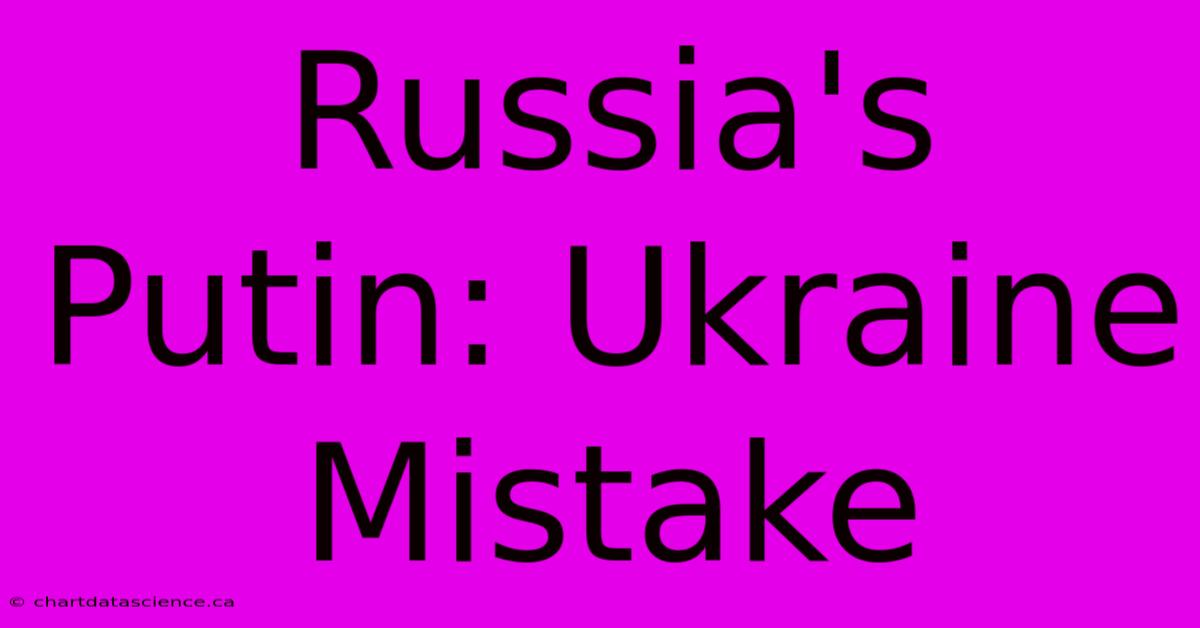Russia's Putin: Ukraine Mistake

Discover more detailed and exciting information on our website. Click the link below to start your adventure: Visit My Website. Don't miss out!
Table of Contents
Russia's Putin: The Ukraine Miscalculation
Vladimir Putin's decision to invade Ukraine in February 2022 is widely considered a profound strategic miscalculation. While initially aiming for a swift victory and regime change, the invasion has instead resulted in a protracted and costly war, significantly damaging Russia's international standing and domestic stability. This article explores the key aspects of this misjudgment, examining the underlying assumptions, the unforeseen consequences, and the potential long-term ramifications for Russia and the global order.
Underestimating Ukrainian Resistance
One of the most significant miscalculations was Putin's apparent underestimation of the Ukrainian people's resolve and the strength of their armed forces. Pre-invasion intelligence assessments, likely flawed or selectively interpreted, predicted a quick collapse of the Ukrainian government and military. Instead, Ukrainians demonstrated fierce resistance, fueled by national pride and a determination to defend their sovereignty. This unexpected level of resistance dramatically altered the course of the conflict, transforming it from a blitzkrieg into a grinding war of attrition.
The Role of Intelligence Failures
The failure to accurately assess Ukrainian capabilities highlights a potential weakness in Russia's intelligence gathering and analysis. Overreliance on biased or incomplete information may have led to a distorted picture of the situation on the ground, contributing significantly to the initial strategic misjudgment. This highlights the crucial importance of accurate and unbiased intelligence in military planning and decision-making.
Overestimating Russia's Capabilities
Putin's calculations also seemed to overestimate Russia's military capabilities and underestimate the West's response. The initial Russian advance was hampered by logistical problems, poor coordination, and unexpectedly strong Ukrainian defenses. The Russian military, despite its size, revealed significant weaknesses in its equipment, training, and overall operational effectiveness.
The West's Unified Response
The swift and unified response from the West, including sanctions, military aid to Ukraine, and a significant shift in geopolitical alliances, was another unforeseen consequence. Putin likely underestimated the extent of international condemnation and the willingness of Western nations to impose severe economic penalties on Russia. This unified response has significantly constrained Russia's economic and political maneuverability.
The Human Cost and Domestic Impact
The war has resulted in a devastating human cost, with thousands of casualties on both sides and a massive refugee crisis. The conflict has also had a significant impact on Russia's domestic situation. The war effort has placed a strain on the Russian economy, leading to inflation and shortages. The imposition of sanctions has further weakened the Russian economy, isolating it from the global financial system. Furthermore, the war has led to increased domestic repression and a crackdown on dissent.
Long-Term Ramifications
The long-term consequences of Putin's decision to invade Ukraine are still unfolding. The war has fundamentally altered the European security landscape, leading to increased military spending and a strengthening of NATO. Russia's international isolation is deepening, and its reputation has suffered irreparable damage. The conflict has also raised serious questions about the future of the post-Cold War international order and the effectiveness of international institutions in preventing and resolving conflicts.
In Conclusion:
Putin's decision to invade Ukraine represents a significant strategic miscalculation with profound consequences for Russia and the world. The underestimation of Ukrainian resistance, overestimation of Russia's capabilities, and misjudgment of the West's response have all contributed to the ongoing conflict, its devastating human cost, and Russia's growing international isolation. The long-term repercussions of this decision will continue to shape global geopolitics for years to come.

Thank you for visiting our website wich cover about Russia's Putin: Ukraine Mistake. We hope the information provided has been useful to you. Feel free to contact us if you have any questions or need further assistance. See you next time and dont miss to bookmark.
Also read the following articles
| Article Title | Date |
|---|---|
| Amazon Us Strike Canadas Response | Dec 20, 2024 |
| Siddiq Labour Minister In Corruption Inquiry | Dec 20, 2024 |
| Chelsea Vs Shamrock Rovers Live Conference League Result | Dec 20, 2024 |
| Breckenridge Explains Virgin Rivers Season 6 End | Dec 20, 2024 |
| Willis Recusal Trump Election Case | Dec 20, 2024 |
